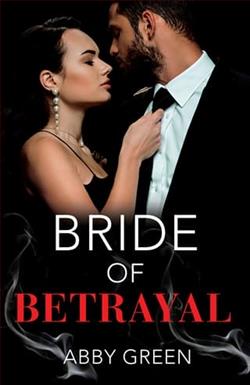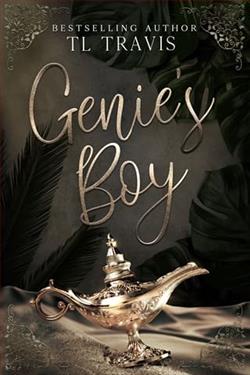Page 2 of Married to the Earl
“It’s the usual scotch, My Lord,” the bartender said.
“Is it?”
“Yes,” the bartender said. “Mr. Wilson has been using the same supplier for months now.”
I haven’t given Henry enough credit for everything he does around here, Conor thought as the bartender refilled his glass.Finding such high-quality scotch and keeping it regularly in stock, without my even having to be involved in the decision…perhaps I should increase his stake in the company.
It was something he had thought about every now and again. When The Arc had first been opened, Conor had put up the bulk of the startup capital. He had included Henry with only a very nominal buy-in because he knew his friend was more adept at managing a business than he was.
And because he has more time on his hands. The responsibilities of my title do not leave me free to spend much of my day at The Arc.
The agreement, when they had opened the business, was that Conor would own eighty percent of it, and that Henry would own twenty. They would split the proceeds accordingly. And so, they always had.
But Henry had been doing such a good job with his responsibilities that Conor felt inclined to revisit that old agreement. It wasn’t as though he needed the money, after all.
I will discuss it with my solicitor, he thought to himself.We’ll take a look at the books, at how much this club is actually earning from month to month, and make a decision about what is practical going forward. I would love to be able to offer something more to Henry than what he’s getting now.
He would be meeting with his solicitor next week. They could discuss it then.
The thought of a meeting with his solicitor gave Conor a pang of dread, though.
It wasn’t that he feared receiving bad news about the financial solvency of his business. The Arc was doing well, and Conor knew it. All the evidence he needed was right in front of him. The place was full of happy patrons having a good time, just as it was every night.
And it wasn’t even as though Conor depended on the club’s success for his own financial wellbeing. He was an earl in his own right, and his title and taxation responsibilities meant that his pockets were never empty. He had started the club not because he needed a business to keep him afloat but because he had thought it might be fun.
So, he didn’t fear what his solicitor might say to him about his books when they met tomorrow. It was the man himself that Conor didn’t like.
Tobias Dawson had rubbed Conor wrong from the moment the two had first met. He was an unpleasant, weaselly, sycophantic little man, and Conor had the feeling he enjoyed the fact that he was solicitor to an earl more than he cared about doing his job well.
He had thought, on more than one occasion, about firing the man and finding someone else. But a few things always stopped him.
For one thing, no matter how much Conor didn’t like him personally, Tobias Dawson was good at his job. He was clever and quick, and he offered good ideas. His suggestions had more than once helped to expand the business. Conor knew enough to know that it would be ill conceived to throw away good help just because the source was such an unpleasant person.
And then there was the fact that it simply wasn’t in his nature to terminate anyone’s employment. Conor hated confrontation, and the idea of taking Tobias aside and telling him their work together was at an end put a very sour taste in his mouth.
I have no idea how I’ve gotten a reputation for being cold and unforgiving, he thought, sipping his scotch. He knew that was the way the rest of thetonsaw him. He had received plenty of intimidated looks in his time. And Henry had told him, too, what guests at the club tended to say about him behind his back.
You need to mingle with them,Henry urged.You need to let them see the real you.
But Conor always declined. Truth be told, he wasn’t overly bothered by his reputation. It just didn’t make a lot of sense to him. When had he ever been cold to anybody? Was it really just because he didn’t go out of his way to socialize?
These people will find anything to gossip about, he thought. There was some disdain in that thought, he recognized, but really. They sat here inhisclub, drinkinghisscotch, confiding inhisbest friend that they found him standoffish. It was just plain rude, wasn’t it? And they said he was the socially inept one!
There were some who might think that being social, being friendly, was an inherent part of being an earl. After all, Conor’s presence was expected at parties and social events. He did have to mingle with other members of thetonon occasion.
But he also had to collect their taxes. It was incumbent upon him, as Earl of Middleborough, to collect money from people. And that sort of thing made it difficult to make friends, even if you were naturally inclined to be social.
It’s really for the best that I’m able to keep my emotions out of my interactions with others, Conor thought.The last thing anyone needs is a sentimental tax collector. I would fall apart the first time I had to take money from anyone, and that’s no way to run things.
In truth, hehadbeen known to waive taxes for people on rare occasions. He had more than once deliberately skipped over a poor, unmarried young mother struggling to make ends meet or a family supporting an elderly parent.
It wasn’t the sort of thing that could be done too often, lest the royals above him notice something was amiss. But as long as he made up the missing money from his own coffers, there was no reason not to give people a break every now and again.
And they say I’m cold. Really!
He drained his drink and stood up, ready to leave the club for the day. He didn’t generally like to spend a lot of time here. It was a good place to stop in and have a drink, and he liked to see that his project was operating smoothly, but Conor would never be one of those people who spent hours and hours at The Arc. This was a place for socializing.
Perhaps that’s why I built it. Perhaps I wanted to fulfill some need to have a social element in my life without actually having to do any socializing myself.















